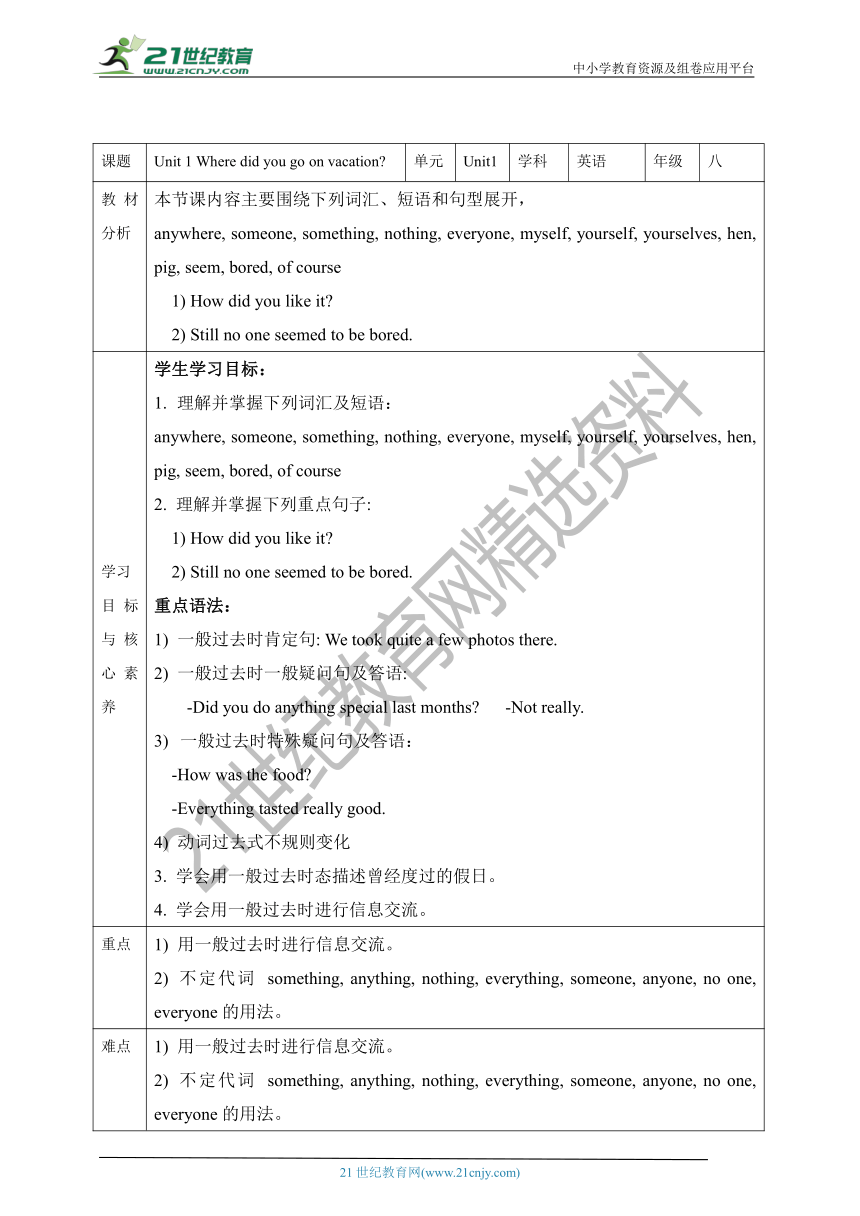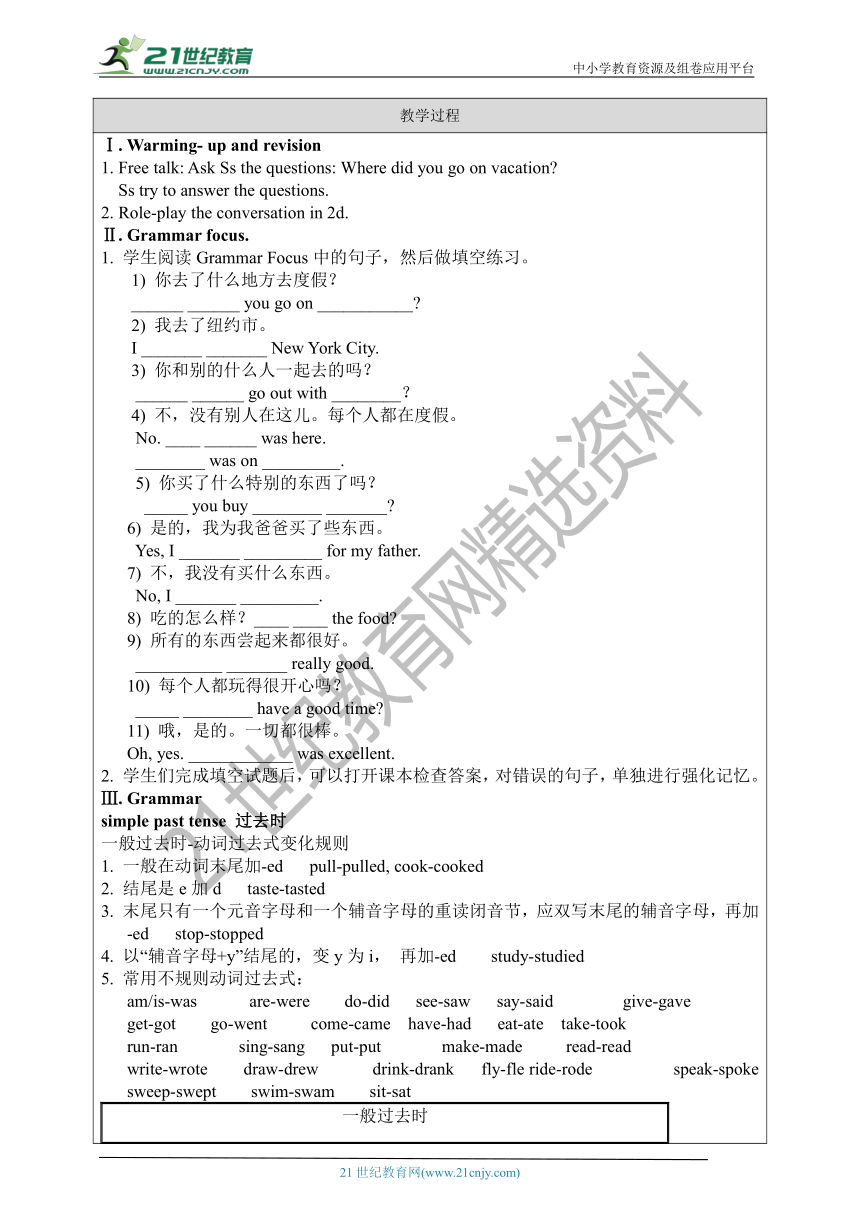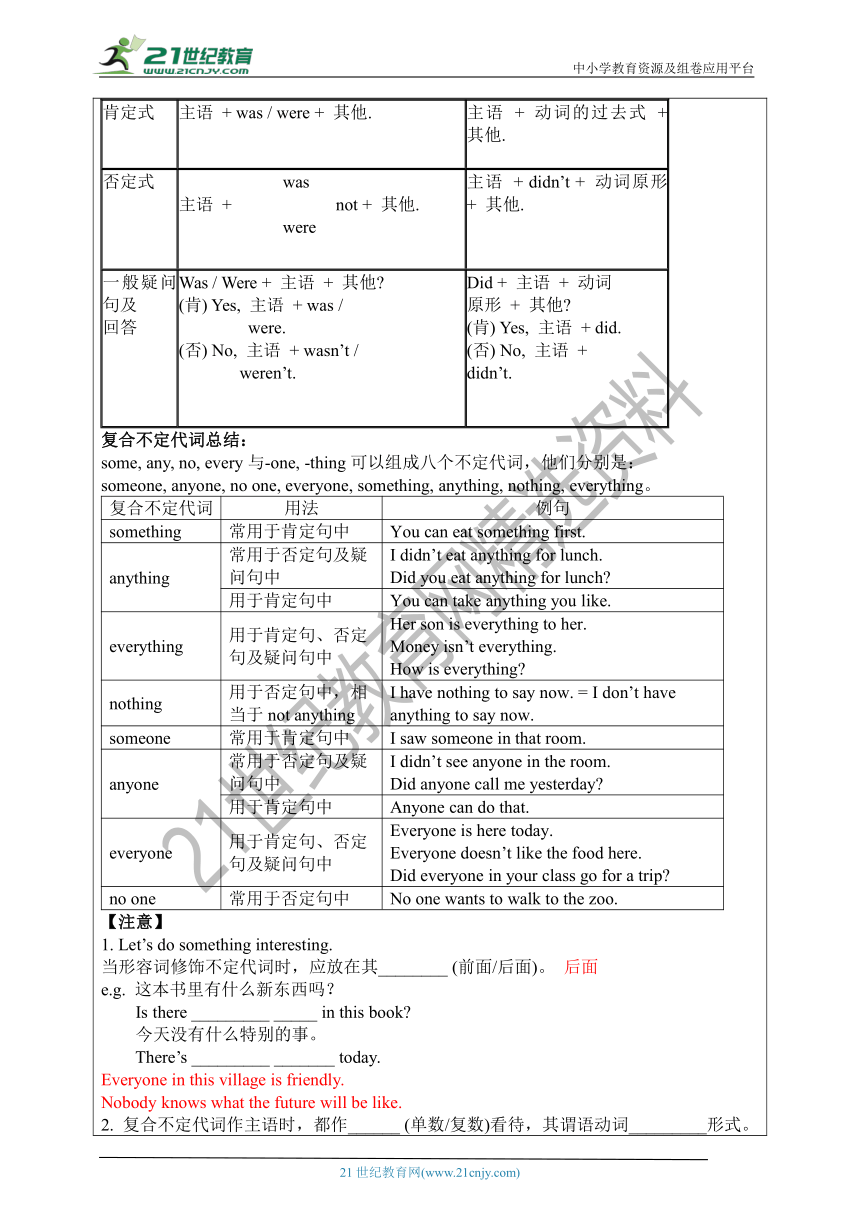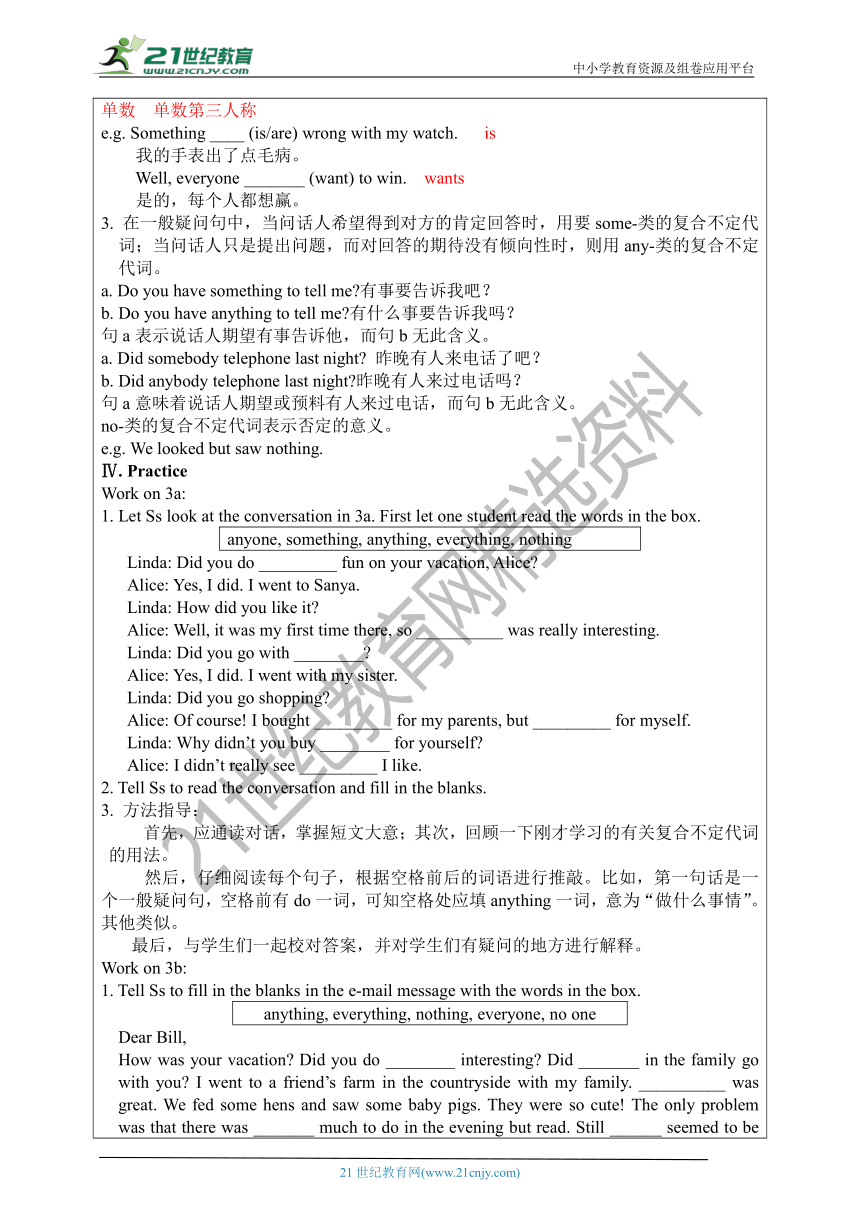【新课标】Unit 1 Where did you go on vacation? Section A (3a-3c) 表格式教案
文档属性
| 名称 | 【新课标】Unit 1 Where did you go on vacation? Section A (3a-3c) 表格式教案 |  | |
| 格式 | zip | ||
| 文件大小 | 1.2MB | ||
| 资源类型 | 试卷 | ||
| 版本资源 | 人教新目标(Go for it)版 | ||
| 科目 | 英语 | ||
| 更新时间 | 2022-08-16 15:57:31 | ||
图片预览




文档简介
中小学教育资源及组卷应用平台
课题 Unit 1 Where did you go on vacation 单元 Unit1 学科 英语 年级 八
教材分析 本节课内容主要围绕下列词汇、短语和句型展开,anywhere, someone, something, nothing, everyone, myself, yourself, yourselves, hen, pig, seem, bored, of course 1) How did you like it 2) Still no one seemed to be bored.
学习目标与核心素养 学生学习目标:理解并掌握下列词汇及短语:anywhere, someone, something, nothing, everyone, myself, yourself, yourselves, hen, pig, seem, bored, of course 2. 理解并掌握下列重点句子: 1) How did you like it 2) Still no one seemed to be bored. 重点语法:1) 一般过去时肯定句: We took quite a few photos there.2) 一般过去时一般疑问句及答语:-Did you do anything special last months -Not really. 一般过去时特殊疑问句及答语:-How was the food -Everything tasted really good.4) 动词过去式不规则变化3. 学会用一般过去时态描述曾经度过的假日。4. 学会用一般过去时进行信息交流。
重点 1) 用一般过去时进行信息交流。2) 不定代词 something, anything, nothing, everything, someone, anyone, no one, everyone的用法。
难点 1) 用一般过去时进行信息交流。2) 不定代词 something, anything, nothing, everything, someone, anyone, no one, everyone的用法。
教学过程
Ⅰ. Warming- up and revision 1. Free talk: Ask Ss the questions: Where did you go on vacation Ss try to answer the questions. 2. Role-play the conversation in 2d.Ⅱ. Grammar focus. 1. 学生阅读Grammar Focus中的句子,然后做填空练习。 1) 你去了什么地方去度假? ______ ______ you go on ___________ 2) 我去了纽约市。 I _______ _______ New York City.3) 你和别的什么人一起去的吗? ______ ______ go out with ________? 4) 不,没有别人在这儿。每个人都在度假。 No. ____ ______ was here. ________ was on _________. 5) 你买了什么特别的东西了吗? _____ you buy ________ _______ 6) 是的,我为我爸爸买了些东西。 Yes, I _______ _________ for my father. 7) 不,我没有买什么东西。 No, I _______ _________.8) 吃的怎么样?____ ____ the food 9) 所有的东西尝起来都很好。 __________ _______ really good. 10) 每个人都玩得很开心吗? _____ ________ have a good time 11) 哦,是的。一切都很棒。 Oh, yes. ____________ was excellent. 2. 学生们完成填空试题后,可以打开课本检查答案,对错误的句子,单独进行强化记忆。Ⅲ. Grammarsimple past tense 过去时一般过去时-动词过去式变化规则1. 一般在动词末尾加-ed pull-pulled, cook-cooked 2. 结尾是e加d taste-tasted 3. 末尾只有一个元音字母和一个辅音字母的重读闭音节,应双写末尾的辅音字母,再加-ed stop-stopped 4. 以“辅音字母+y”结尾的,变y为i, 再加-ed study-studied 5. 常用不规则动词过去式: am/is-was are-were do-did see-saw say-said give-gave get-got go-went come-came have-had eat-ate take-took run-ran sing-sang put-put make-made read-read write-wrote draw-drew drink-drank fly-fle ride-rode speak-spoke sweep-swept swim-swam sit-sat一般过去时肯定式主语 + was / were + 其他.主语 + 动词的过去式 + 其他.否定式 was主语 + not + 其他. were主语 + didn’t + 动词原形 + 其他.一般疑问句及 回答Was / Were + 主语 + 其他 (肯) Yes, 主语 + was / were.(否) No, 主语 + wasn’t / weren’t.Did + 主语 + 动词 原形 + 其他 (肯) Yes, 主语 + did. (否) No, 主语 + didn’t.复合不定代词总结:some, any, no, every与-one, -thing可以组成八个不定代词,他们分别是: someone, anyone, no one, everyone, something, anything, nothing, everything。复合不定代词用法例句something常用于肯定句中You can eat something first.anything常用于否定句及疑问句中I didn’t eat anything for lunch.Did you eat anything for lunch 用于肯定句中You can take anything you like.everything用于肯定句、否定句及疑问句中Her son is everything to her.Money isn’t everything.How is everything nothing用于否定句中,相当于not anythingI have nothing to say now. = I don’t have anything to say now.someone常用于肯定句中I saw someone in that room.anyone常用于否定句及疑问句中I didn’t see anyone in the room.Did anyone call me yesterday 用于肯定句中Anyone can do that.everyone用于肯定句、否定句及疑问句中Everyone is here today.Everyone doesn’t like the food here.Did everyone in your class go for a trip no one常用于否定句中No one wants to walk to the zoo.【注意】1. Let’s do something interesting.当形容词修饰不定代词时,应放在其________ (前面/后面)。 后面e.g. 这本书里有什么新东西吗? Is there _________ _____ in this book 今天没有什么特别的事。 There’s _________ _______ today.Everyone in this village is friendly.Nobody knows what the future will be like.2. 复合不定代词作主语时,都作______ (单数/复数)看待,其谓语动词_________形式。 单数 单数第三人称e.g. Something ____ (is/are) wrong with my watch. is 我的手表出了点毛病。 Well, everyone _______ (want) to win. wants 是的,每个人都想赢。3. 在一般疑问句中,当问话人希望得到对方的肯定回答时,用要some-类的复合不定代词;当问话人只是提出问题,而对回答的期待没有倾向性时,则用any-类的复合不定代词。 a. Do you have something to tell me 有事要告诉我吧?b. Do you have anything to tell me 有什么事要告诉我吗?句a表示说话人期望有事告诉他,而句b无此含义。a. Did somebody telephone last night 昨晚有人来电话了吧?b. Did anybody telephone last night 昨晚有人来过电话吗?句a意味着说话人期望或预料有人来过电话,而句b无此含义。no-类的复合不定代词表示否定的意义。e.g. We looked but saw nothing.Ⅳ. Practice Work on 3a: 1. Let Ss look at the conversation in 3a. First let one student read the words in the box. anyone, something, anything, everything, nothingLinda: Did you do _________ fun on your vacation, Alice Alice: Yes, I did. I went to Sanya. Linda: How did you like it Alice: Well, it was my first time there, so __________ was really interesting. Linda: Did you go with ________ Alice: Yes, I did. I went with my sister. Linda: Did you go shopping Alice: Of course! I bought _________ for my parents, but _________ for myself. Linda: Why didn’t you buy ________ for yourself Alice: I didn’t really see _________ I like. 2. Tell Ss to read the conversation and fill in the blanks. 3. 方法指导:首先,应通读对话,掌握短文大意;其次,回顾一下刚才学习的有关复合不定代词的用法。然后,仔细阅读每个句子,根据空格前后的词语进行推敲。比如,第一句话是一个一般疑问句,空格前有do一词,可知空格处应填anything一词,意为“做什么事情”。其他类似。最后,与学生们一起校对答案,并对学生们有疑问的地方进行解释。Work on 3b: 1. Tell Ss to fill in the blanks in the e-mail message with the words in the box. anything, everything, nothing, everyone, no one Dear Bill, How was your vacation Did you do ________ interesting Did _______ in the family go with you I went to a friend’s farm in the countryside with my family. __________ was great. We fed some hens and saw some baby pigs. They were so cute! The only problem was that there was _______ much to do in the evening but read. Still ______ seemed to be bored. Bye for now!Mark2. T: There are some important impressions in the message. Read and learn them by your heart.The only problem is / was that …nothing much to do but read seem to be … Bye for now! V. Group work 1. Work on 3c: Ask your group questions about their vacation. Then tell the class your results. Did you…EveryoneSomeone (name)No oneeat anything at a restaurant read anything interesting visit anyone in your family buy anything keep a diary 2. Fill in the blanks according to the answers.3. Try to make a report in each group. Then let one student read the report to the class. VI. Language points 1. 反身代词讲解myselfyourselfhimselfherselfitself我自己你自己他自己她自己它自己ourselvesyourselvesthemselves我们自己你们自己他们自己 1)Did you buy anything for yourself 你为你自己买什么东西了吗 (做介词宾语)2) The old man taught himself English. 那位老人自学英语。(做动词宾语)3) The thing itself is not important. 事情本身并不重要。(做同位语)4) I myself visited my aunt last weekend. 上周我自己去拜访了姑姑。(做同位语)2. How did you like it 句型How ... sb. like ... 与What ... sb. think of ... 同义,意为“某人觉得……怎么样?”。如: How do you like the TV show =What do you think of the TV show 你觉得这个电视节目怎么样?3. Still no one seemed to be bored. seem意为“好像;似乎;看来”,其主要用法如下:◆seem+(to be)+adj. 如: The movie seems (to be) interesting. 这部电影似乎很有趣。◆seem to do sth. 如: The boy seems to know nothing about it. 这个男孩似乎对它一无所知。◆It seems that ... 如: It seems that Mr. Zhang is at home. 张先生好像在家。 据汉语意思完成英语句子。1) 这儿的衣服似乎很贵。 The clothes here ___________ very expensive.2) 他们似乎周六要去上海。 They seem _______ to Shanghai on Saturday.3) 好像今天她要开车去上班。 _____________ she’ll drive to work today. Keys: seem to be to go It seems that boredboring 与 bored 的用法区别bored 和 boring 是动词 bore 的两个形容词。bored 表示 “ 感到厌烦的 ”,用来指人;boring 表示 “ 令人厌烦的 ”,用来指物。翻译下列句子1) 这部电视剧很无聊。 The TV play is boring.2) 我很无聊。 I am very bored.VII. ExercisesⅠ. 根据汉语意思完成英语句子,每空一词。1. 莉莉在超市什么也没买。 Lily ________ ________ in the supermarket. 2. 刚才大家都在这儿。 ________ ________ here just now. 3. 今天早上有人喂过猪了。 This morning ________ ________ the ________. Ⅱ. 根据括号内的要求完成下列各题,每空一词。1. We did something interesting in the park. (改为一般疑问句) _________ you _________ _________ _________ in the park 2. The dinner was delicious. (对划线部分提问) _________ _________ the dinner Ⅱ. 根据括号内的要求完成下列各题,每空一词。1. We did something interesting in the park. (改为一般疑问句) _________ you _________ _________ _________ in the park 2. The dinner was delicious. (对划线部分提问) _________ _________ the dinner 3. My aunt went to Shanghai on vacation. (对划线部分问) _________ _________ your aunt _________ on vacation 4. What did you think of this place (改为同义句) _________ did you _________ this place Ⅲ. 根据短文内容,从方框中选择恰当的动词 并用其正确时态填空。 arrive, finish, listen, play, start, talk, work, have My first day at collegeI remember my first day at college. I (1) ________ at 8:30 and (2) ________ lessons at 9:00. We (3) ________ from 9:00 to 11:00. The teachers (4) ________ to us a lot! Then we (5) ________ basketball for an hour. At noon, we (6) ________ lunch at the canteen (食堂). In the afternoon we continued (继续) the lessons and (7) ________ to the teacher carefully. Then at 4:30 the lessons (8) ________. It was a long and tiring day! Keys: I. 1. bought nothing 2. Everyone was 3. Someone fed…pig(s) II. 1. Did…do anything interesting 2. How was 3. Where did…go 4. How…like III. 1. arrived 2. started 3. worked 4. talked 5. played 6. had 7. listened 8. FinishedVIII.. Homework 1. 复习复合不定代词及的用法。 2. 记忆更多的动词过去式不规则变化。 …
课堂小结 Summary go shopping 购物keep a diary 记日记in the countryside 在乡下feed hens 喂母鸡*anyone, someone, everyone, no one, anything, something, everything 及 nothing 的用法*一般过去时的用法及动词过去式规则、不规则的变化
板书 anywhere, someone, something, nothing, everyone, myself, yourself, yourselves, hen, pig, seem, bored, of course
人教版英语八年级上册第2课时教学设计
21世纪教育网 www.21cnjy.com 精品试卷·第 2 页 (共 2 页)
HYPERLINK "http://www.21cnjy.com/" 21世纪教育网(www.21cnjy.com)
课题 Unit 1 Where did you go on vacation 单元 Unit1 学科 英语 年级 八
教材分析 本节课内容主要围绕下列词汇、短语和句型展开,anywhere, someone, something, nothing, everyone, myself, yourself, yourselves, hen, pig, seem, bored, of course 1) How did you like it 2) Still no one seemed to be bored.
学习目标与核心素养 学生学习目标:理解并掌握下列词汇及短语:anywhere, someone, something, nothing, everyone, myself, yourself, yourselves, hen, pig, seem, bored, of course 2. 理解并掌握下列重点句子: 1) How did you like it 2) Still no one seemed to be bored. 重点语法:1) 一般过去时肯定句: We took quite a few photos there.2) 一般过去时一般疑问句及答语:-Did you do anything special last months -Not really. 一般过去时特殊疑问句及答语:-How was the food -Everything tasted really good.4) 动词过去式不规则变化3. 学会用一般过去时态描述曾经度过的假日。4. 学会用一般过去时进行信息交流。
重点 1) 用一般过去时进行信息交流。2) 不定代词 something, anything, nothing, everything, someone, anyone, no one, everyone的用法。
难点 1) 用一般过去时进行信息交流。2) 不定代词 something, anything, nothing, everything, someone, anyone, no one, everyone的用法。
教学过程
Ⅰ. Warming- up and revision 1. Free talk: Ask Ss the questions: Where did you go on vacation Ss try to answer the questions. 2. Role-play the conversation in 2d.Ⅱ. Grammar focus. 1. 学生阅读Grammar Focus中的句子,然后做填空练习。 1) 你去了什么地方去度假? ______ ______ you go on ___________ 2) 我去了纽约市。 I _______ _______ New York City.3) 你和别的什么人一起去的吗? ______ ______ go out with ________? 4) 不,没有别人在这儿。每个人都在度假。 No. ____ ______ was here. ________ was on _________. 5) 你买了什么特别的东西了吗? _____ you buy ________ _______ 6) 是的,我为我爸爸买了些东西。 Yes, I _______ _________ for my father. 7) 不,我没有买什么东西。 No, I _______ _________.8) 吃的怎么样?____ ____ the food 9) 所有的东西尝起来都很好。 __________ _______ really good. 10) 每个人都玩得很开心吗? _____ ________ have a good time 11) 哦,是的。一切都很棒。 Oh, yes. ____________ was excellent. 2. 学生们完成填空试题后,可以打开课本检查答案,对错误的句子,单独进行强化记忆。Ⅲ. Grammarsimple past tense 过去时一般过去时-动词过去式变化规则1. 一般在动词末尾加-ed pull-pulled, cook-cooked 2. 结尾是e加d taste-tasted 3. 末尾只有一个元音字母和一个辅音字母的重读闭音节,应双写末尾的辅音字母,再加-ed stop-stopped 4. 以“辅音字母+y”结尾的,变y为i, 再加-ed study-studied 5. 常用不规则动词过去式: am/is-was are-were do-did see-saw say-said give-gave get-got go-went come-came have-had eat-ate take-took run-ran sing-sang put-put make-made read-read write-wrote draw-drew drink-drank fly-fle ride-rode speak-spoke sweep-swept swim-swam sit-sat一般过去时肯定式主语 + was / were + 其他.主语 + 动词的过去式 + 其他.否定式 was主语 + not + 其他. were主语 + didn’t + 动词原形 + 其他.一般疑问句及 回答Was / Were + 主语 + 其他 (肯) Yes, 主语 + was / were.(否) No, 主语 + wasn’t / weren’t.Did + 主语 + 动词 原形 + 其他 (肯) Yes, 主语 + did. (否) No, 主语 + didn’t.复合不定代词总结:some, any, no, every与-one, -thing可以组成八个不定代词,他们分别是: someone, anyone, no one, everyone, something, anything, nothing, everything。复合不定代词用法例句something常用于肯定句中You can eat something first.anything常用于否定句及疑问句中I didn’t eat anything for lunch.Did you eat anything for lunch 用于肯定句中You can take anything you like.everything用于肯定句、否定句及疑问句中Her son is everything to her.Money isn’t everything.How is everything nothing用于否定句中,相当于not anythingI have nothing to say now. = I don’t have anything to say now.someone常用于肯定句中I saw someone in that room.anyone常用于否定句及疑问句中I didn’t see anyone in the room.Did anyone call me yesterday 用于肯定句中Anyone can do that.everyone用于肯定句、否定句及疑问句中Everyone is here today.Everyone doesn’t like the food here.Did everyone in your class go for a trip no one常用于否定句中No one wants to walk to the zoo.【注意】1. Let’s do something interesting.当形容词修饰不定代词时,应放在其________ (前面/后面)。 后面e.g. 这本书里有什么新东西吗? Is there _________ _____ in this book 今天没有什么特别的事。 There’s _________ _______ today.Everyone in this village is friendly.Nobody knows what the future will be like.2. 复合不定代词作主语时,都作______ (单数/复数)看待,其谓语动词_________形式。 单数 单数第三人称e.g. Something ____ (is/are) wrong with my watch. is 我的手表出了点毛病。 Well, everyone _______ (want) to win. wants 是的,每个人都想赢。3. 在一般疑问句中,当问话人希望得到对方的肯定回答时,用要some-类的复合不定代词;当问话人只是提出问题,而对回答的期待没有倾向性时,则用any-类的复合不定代词。 a. Do you have something to tell me 有事要告诉我吧?b. Do you have anything to tell me 有什么事要告诉我吗?句a表示说话人期望有事告诉他,而句b无此含义。a. Did somebody telephone last night 昨晚有人来电话了吧?b. Did anybody telephone last night 昨晚有人来过电话吗?句a意味着说话人期望或预料有人来过电话,而句b无此含义。no-类的复合不定代词表示否定的意义。e.g. We looked but saw nothing.Ⅳ. Practice Work on 3a: 1. Let Ss look at the conversation in 3a. First let one student read the words in the box. anyone, something, anything, everything, nothingLinda: Did you do _________ fun on your vacation, Alice Alice: Yes, I did. I went to Sanya. Linda: How did you like it Alice: Well, it was my first time there, so __________ was really interesting. Linda: Did you go with ________ Alice: Yes, I did. I went with my sister. Linda: Did you go shopping Alice: Of course! I bought _________ for my parents, but _________ for myself. Linda: Why didn’t you buy ________ for yourself Alice: I didn’t really see _________ I like. 2. Tell Ss to read the conversation and fill in the blanks. 3. 方法指导:首先,应通读对话,掌握短文大意;其次,回顾一下刚才学习的有关复合不定代词的用法。然后,仔细阅读每个句子,根据空格前后的词语进行推敲。比如,第一句话是一个一般疑问句,空格前有do一词,可知空格处应填anything一词,意为“做什么事情”。其他类似。最后,与学生们一起校对答案,并对学生们有疑问的地方进行解释。Work on 3b: 1. Tell Ss to fill in the blanks in the e-mail message with the words in the box. anything, everything, nothing, everyone, no one Dear Bill, How was your vacation Did you do ________ interesting Did _______ in the family go with you I went to a friend’s farm in the countryside with my family. __________ was great. We fed some hens and saw some baby pigs. They were so cute! The only problem was that there was _______ much to do in the evening but read. Still ______ seemed to be bored. Bye for now!Mark2. T: There are some important impressions in the message. Read and learn them by your heart.The only problem is / was that …nothing much to do but read seem to be … Bye for now! V. Group work 1. Work on 3c: Ask your group questions about their vacation. Then tell the class your results. Did you…EveryoneSomeone (name)No oneeat anything at a restaurant read anything interesting visit anyone in your family buy anything keep a diary 2. Fill in the blanks according to the answers.3. Try to make a report in each group. Then let one student read the report to the class. VI. Language points 1. 反身代词讲解myselfyourselfhimselfherselfitself我自己你自己他自己她自己它自己ourselvesyourselvesthemselves我们自己你们自己他们自己 1)Did you buy anything for yourself 你为你自己买什么东西了吗 (做介词宾语)2) The old man taught himself English. 那位老人自学英语。(做动词宾语)3) The thing itself is not important. 事情本身并不重要。(做同位语)4) I myself visited my aunt last weekend. 上周我自己去拜访了姑姑。(做同位语)2. How did you like it 句型How ... sb. like ... 与What ... sb. think of ... 同义,意为“某人觉得……怎么样?”。如: How do you like the TV show =What do you think of the TV show 你觉得这个电视节目怎么样?3. Still no one seemed to be bored. seem意为“好像;似乎;看来”,其主要用法如下:◆seem+(to be)+adj. 如: The movie seems (to be) interesting. 这部电影似乎很有趣。◆seem to do sth. 如: The boy seems to know nothing about it. 这个男孩似乎对它一无所知。◆It seems that ... 如: It seems that Mr. Zhang is at home. 张先生好像在家。 据汉语意思完成英语句子。1) 这儿的衣服似乎很贵。 The clothes here ___________ very expensive.2) 他们似乎周六要去上海。 They seem _______ to Shanghai on Saturday.3) 好像今天她要开车去上班。 _____________ she’ll drive to work today. Keys: seem to be to go It seems that boredboring 与 bored 的用法区别bored 和 boring 是动词 bore 的两个形容词。bored 表示 “ 感到厌烦的 ”,用来指人;boring 表示 “ 令人厌烦的 ”,用来指物。翻译下列句子1) 这部电视剧很无聊。 The TV play is boring.2) 我很无聊。 I am very bored.VII. ExercisesⅠ. 根据汉语意思完成英语句子,每空一词。1. 莉莉在超市什么也没买。 Lily ________ ________ in the supermarket. 2. 刚才大家都在这儿。 ________ ________ here just now. 3. 今天早上有人喂过猪了。 This morning ________ ________ the ________. Ⅱ. 根据括号内的要求完成下列各题,每空一词。1. We did something interesting in the park. (改为一般疑问句) _________ you _________ _________ _________ in the park 2. The dinner was delicious. (对划线部分提问) _________ _________ the dinner Ⅱ. 根据括号内的要求完成下列各题,每空一词。1. We did something interesting in the park. (改为一般疑问句) _________ you _________ _________ _________ in the park 2. The dinner was delicious. (对划线部分提问) _________ _________ the dinner 3. My aunt went to Shanghai on vacation. (对划线部分问) _________ _________ your aunt _________ on vacation 4. What did you think of this place (改为同义句) _________ did you _________ this place Ⅲ. 根据短文内容,从方框中选择恰当的动词 并用其正确时态填空。 arrive, finish, listen, play, start, talk, work, have My first day at collegeI remember my first day at college. I (1) ________ at 8:30 and (2) ________ lessons at 9:00. We (3) ________ from 9:00 to 11:00. The teachers (4) ________ to us a lot! Then we (5) ________ basketball for an hour. At noon, we (6) ________ lunch at the canteen (食堂). In the afternoon we continued (继续) the lessons and (7) ________ to the teacher carefully. Then at 4:30 the lessons (8) ________. It was a long and tiring day! Keys: I. 1. bought nothing 2. Everyone was 3. Someone fed…pig(s) II. 1. Did…do anything interesting 2. How was 3. Where did…go 4. How…like III. 1. arrived 2. started 3. worked 4. talked 5. played 6. had 7. listened 8. FinishedVIII.. Homework 1. 复习复合不定代词及的用法。 2. 记忆更多的动词过去式不规则变化。 …
课堂小结 Summary go shopping 购物keep a diary 记日记in the countryside 在乡下feed hens 喂母鸡*anyone, someone, everyone, no one, anything, something, everything 及 nothing 的用法*一般过去时的用法及动词过去式规则、不规则的变化
板书 anywhere, someone, something, nothing, everyone, myself, yourself, yourselves, hen, pig, seem, bored, of course
人教版英语八年级上册第2课时教学设计
21世纪教育网 www.21cnjy.com 精品试卷·第 2 页 (共 2 页)
HYPERLINK "http://www.21cnjy.com/" 21世纪教育网(www.21cnjy.com)
同课章节目录
- Unit 1 Where did you go on vacation?
- Section A
- Section B
- Unit 2 How often do you exercise?
- Section A
- Section B
- Unit 3 I'm more outgoing than my sister.
- Section A
- Section B
- Unit 4 What's the best movie theater?
- Section A
- Section B
- Unit 5 Do you want to watch a game show?
- Section A
- Section B
- Unit 6 I'm going to study computer science.
- Section A
- Section B
- Unit 7 Will people have robots?
- Section A
- Section B
- Unit 8 How do you make a banana milk shake?
- Section A
- Section B
- Unit 9 Can you come to my party?
- Section A
- Section B
- Unit 10 If you go to the party, you'll have a grea
- Section A
- Section B
